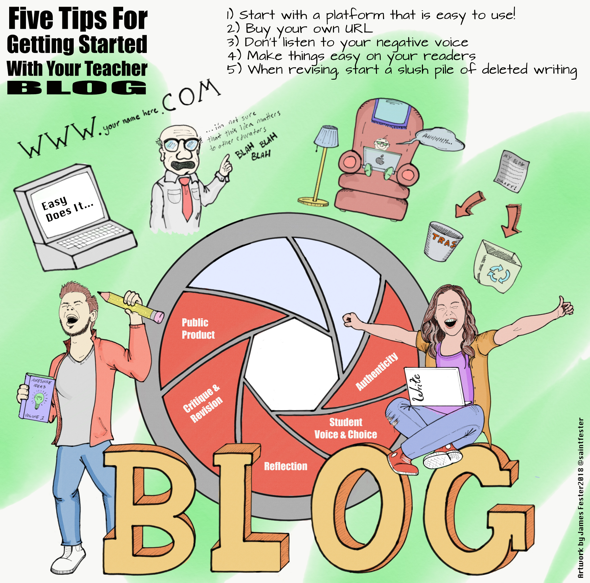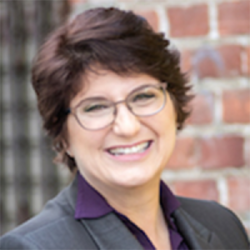
(With contributions from James Fester)
This past fall, during the BIE Fall Summit in Detroit, a group of National Faculty sat down to talk about the importance of blogging as an educator. Some of us came from years of experience; others were just beginning to mull it over. Here are some highlights:
Why Should Educators Blog?
Two reasons:
- We do it for us.
- We do it for them.
Blogging helps us to up our game as practitioners. It provides a one-two punch of effectiveness through reflection and sharing. Mike Gorman, National Faculty with BIE and the CEO of 21centuryedtech has been blogging for over ten years. He says:
“A teacher should start blogging to focus and amplify their own metacognition in relationship to student learning. Think of it as a journal that allows the teacher to reflect on their practice while navigating the pathway of authentic learning. This journal will soon become filled with ideas and resources that can also be shared with others. Blogging is an act that begins with an internal purpose and grows to an outcome of benefiting the greater education community.”
So blogging makes your own process transparent, and being transparent with the struggles we have as teachers helps us all to learn. Blogging brings a community of teachers to your doorstep, educators to collaborate with and grow from.
There are bloggers who specialize in particular strategies. There are bloggers who offer a curated archive of resources and guides. There are those who share their passion for equity and policy. If a teacher is curious about the research on flexible seating or sadly searching for strategies in teaching students suffering from trauma, there are teachers out there sharing their reality, their reflections, and their realizations. And your voice, your reflections, and your experiences may very well by the unique voice someone out there is hoping to find.
How blogging can help students
Blogging by teachers has a link to student achievement, because it models the culture and ways of thinking needed for PBL. Kelly Gallagher, writing teacher and author, argues about the power of modeling in his book Write Like This: Teaching Real World Writing Through Modeling and Mentor Texts. Of his process, he says, “I don’t tell them how to draft their papers; I show them how I draft my papers.” He argues that teachers who model pedagogy help students to embed those strategies as well.
My colleague and mentor, Liz Harrington, a fellow of the National Writing Project, had her students maintain blogs using Kidblog as a means to share their independent reading, critique each other’s literary analyses, and reflect on their learning process. Meanwhile, she kept her own blog as well, allowing students to comment, critique, and analyze her own writing, right alongside them. It became a way not only to model giving critique, but receiving it as well. As a wonderful side note, it also helped to strengthen the classroom community.
Additionally, blogging helps model real-world writing. Gallagher states, “If I want my students to work toward becoming real-world writers, I need to shift the focus of my writing instruction toward real-world writing purposes.” By modeling real-world writing of their own, teachers encourage writing that uncouples from the inauthentic 5-paragraph essay format.
How our own blogging aligns with PBL
The act of blogging hits on so many of the Gold Standard Elements of a PBL unit:
- Blogging is a process of reflection, and we continuously want our kids to reflect on their learning and their thinking as well.
- Blogging tends to be more fluid and dynamic than mere essay-writing. It embraces critique and revision. As bloggers learn more, they update their work. This is an accepted practice in the blogging community.
- Blogging is also authentic in many ways. For one thing, it has an authentic audience. As a teacher-blogger, we clearly have an educational audience, but there are so many more out there to write for. It is also an authentic assessment that reflects more real-world writing skills. Blogging has become an accessible way for anybody to explore citizen journalism, and PBL is oft-times focused on advocacy.
- Blogging honors voice, giving the writer an opportunity to be recognized for their ideas and solutions. Our students should know that in many cases, “if you blog it, they will come.” They can have an impact with their words.
Tips for Beginning Bloggers
- Start with a platform that’s easy to use. Don’t let tech be a gatekeeper. Try something like Wordpress, Squarespace, Weebly, or Wix. Even the kid-friendly Kidblog is something to check out.
- Buy your own URL. Grab a catchy name of your own that’s easy for people to find or that captures the tone of the intention of the blog.
- Don’t listen to your negative voice. This is your blog. You are writing for you, even if you hope others will find it. It’s OK if it’s not perfect. You can always go back and change it. You are sharing an ongoing process, and it’s OK if that means it’s more fluid and formative than ultimately summative.
- Make things easy on your readers. Provide a title that is the main idea or message of the post. Add links for research as well and for search engine optimization. Select “Open link in new window” so your readers can just click to the tab rather than losing your post altogether.
- When revising, start a slush pile of deleted writing. Don’t throw out your writing entirely when you’re revising a post. That can be heartbreaking, and you never know when you might need that turn-of-phrase again. Instead, cut the writing from the post and paste it into a document of similar phrases, sentences, and paragraphs.
There’s no doubt that when you first start writing as a teacher, it can be uncomfortable. But that’s the place where learning happens. Challenge yourself to get your voice out there, and you just might find that other educators were looking to hear from someone just like you.

